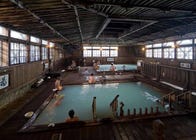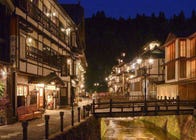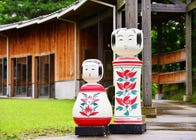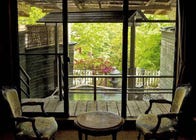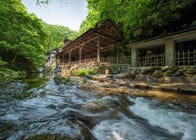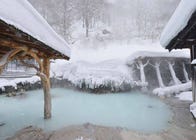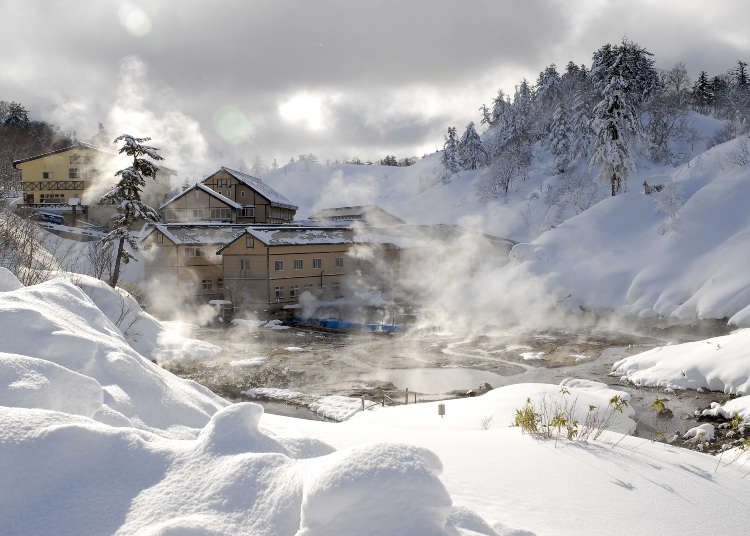
5 Secluded Onsen Hot Springs in the Tohoku Region: Enjoy Awe-Inducing Views of Wintery Steam
- Written by: Masakazu Yoshida
Japanese people have a great love for hot springs, which are often featured in TV shows and magazines. During the vacation season, these resorts are usually crowded with visitors. In the mountainous areas of Japan's Tohoku region, there are many secluded onsen hot springs, known as "hitou." The waters of these hitous have excellent qualities that warm anyone who visits them.
Here, we will introduce the top five must-visit secret onsen in the region, as chosen by one of our writers who is a huge Tohoku fan. Surrounding oneself with a snowy and steamy landscape is truly an extraordinary experience!
Since many of these hot spring resorts are situated in nature, we recommend traveling by car.
Main image: PIXTA
- Table of Contents
-
- 1. Tamagawa Onsen (Akita Prefecture): One of Japan’s Most Acidic Hot Springs!
- 2. Zao Onsen (Yamagata Prefecture): Enjoy Beautiful Rustic Views from a Large Open-air Bath
- 3. Goshogake Onsen (Akita Prefecture): An Elegant Hot Spring Resort with Views of Rising Steam
- 4. Sakayu Onsen (Amori Prefecture): A Hot Spring Birthed from Volcanos on the Hakkoda Mountains
- 5. Oyasukyo Onsen (Akita Prefecture): Enjoy Beautiful Views of a Gorge
1. Tamagawa Onsen (Akita Prefecture): One of Japan’s Most Acidic Hot Springs!
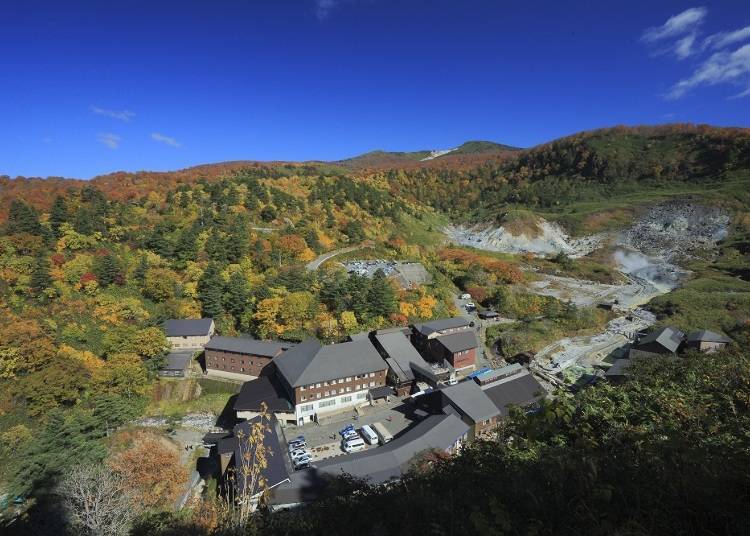
Located a one-hour drive from the Akita Shinkansen stop-Tazawako Station, Tamagawa Onsen can be found inside Towada-Hachimantai National Park.
Although this hot spring resort is only open during the short period of mid-April to late November, many go out of their way to bathe in the waters of this hitou found in a primeval forest.
One of the most shared stories about the hot spring is that it was discovered, in the year 1680, by local and traditional Japanese hunters called Matagi.
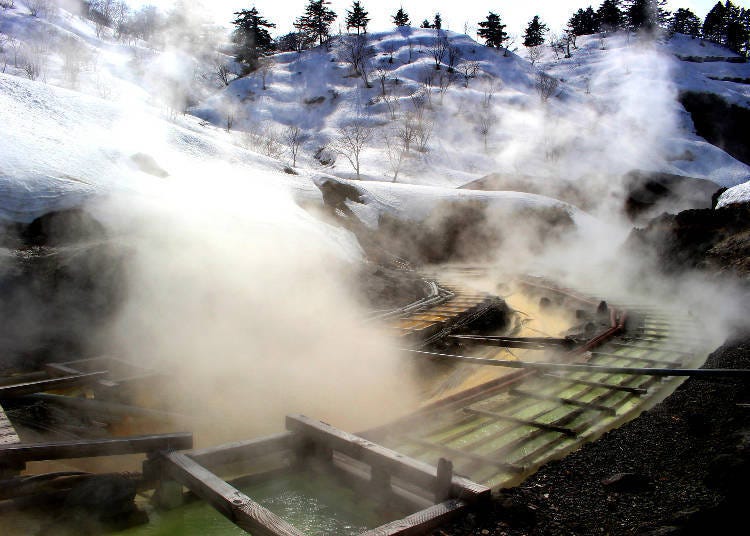
Large amounts of hot spring water can be found at one of its gushing points called Obuke or Big Gusher.
Here, 9,000 liters of highly acidic hot spring water, with the main component being hydrochloric acid, flow per minute.
The bubbling pale blue water at Obuke makes you feel as though you’re witnessing the Earth sigh.
Additionally, Tamagawa Onsen has been long known as a site where you can book extended stays for therapeutic bathing or toji.
Bathing here is said to help cure and alleviate the symptoms of conditions such as high blood pressure, arteriosclerosis, skin diseases, asthma, and more.
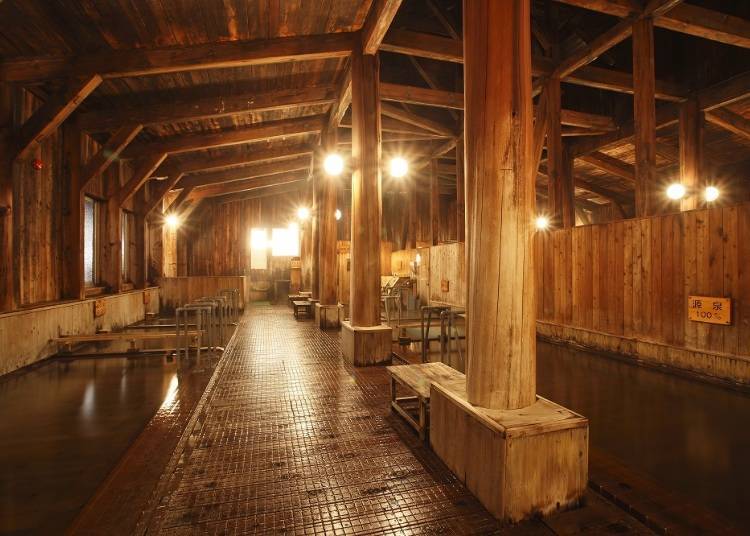
For accommodation, you can choose from either a traditional Japanese inn that serves meals or a toji center, where guests generally book longer stays and prepare meals themselves.
What’s more, there are several different types of baths to enjoy at the resort's large communal hot spring! This includes a free-flowing bath where all the water comes from the hot spring source, a utase-yu - streams of water that cascade from a high point to massage your back; shallow, lie-down baths where you can relax by lying, letting your head rest in the water; as well as hako-mushi - 50°C box-type steam baths that get you to sweat out all unwanted toxins.
Around the accommodation facilities are areas called jigoku-chitai or hell zones. Contrary to its name, here, you can lay out on woven reed mats to enjoy the heavenly experience of taking a bedrock bath. Please make sure to fully delight in all of the soothing hot spring options available!
Although there are no signs or guides in foreign languages available at the facility, there are both English and Chinese pages on Tamagawa Hot Spring’s official website.
-

-
Address
Lake Tazawa, Senboku City, Akita Prefecture Tamagawa Shibukurosawa, 014-1205
View Map -
Nearest Station
Tazawako Station (Tazawako Line)
80 minutes by bus
- Phone Number 0187-58-3000
-
Address
Lake Tazawa, Senboku City, Akita Prefecture Tamagawa Shibukurosawa, 014-1205
2. Zao Onsen (Yamagata Prefecture): Enjoy Beautiful Rustic Views from a Large Open-air Bath
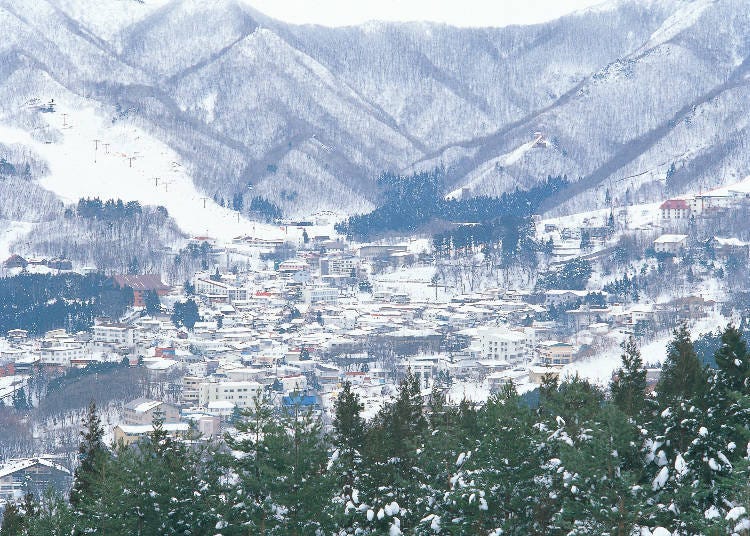
Zao Onsen is located a 40-minute drive from JR’s Yamagata Station.
Over 1900 years ago, Yamato Takeru, who was part of the imperial family, rose to power and sent his troops to the Tohoku region.
During this time, Kibino Tagayu, one of the military officers leading the army, was said to have stumbled upon the hot spring. During the Edo period (1603~1868), the area around this spring was used as a western mountain pass to get to the Buddhist- mountain deity, Zao Gongen.
Furthermore, in the Taisho period (1912~1926), a path was built from the foot of the mountain to the hot spring’s source. After this, a ski resort was opened on the mountain in 1925, making Zao Onsen a pioneer in the hot spring resort industry.
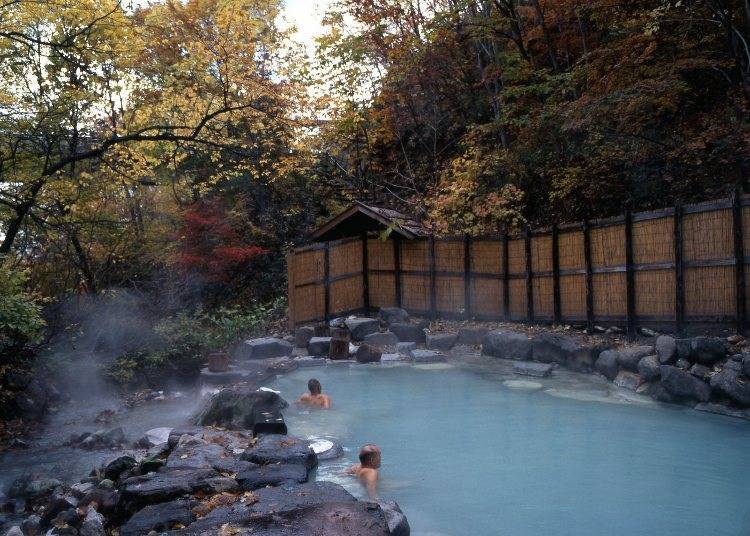
Zao Onsen’s hot spring water comes from a highly acidic sulfur spring. The spring’s water is known to promote blood flow and make skin stronger by strengthening the epidermis.
In addition to the hot spring baths available at the resort’s traditional Japanese inns and hotels, there are also three communal baths, three footbath facilities, and five day-use hot springs to enjoy!
Zao Onsen's large open-air bath is a short walk from the hot spring resort. This is a hot spring that you absolutely cannot miss!
Using water from a mountain stream, the healing properties of this hot spring target all five of the senses! Here, you can enjoy a truly luxurious experience while being soothed by the sounds of chirping birds and a lapping river.
Unwind and enjoy the rustic atmosphere provided by the communal baths and traditional Japanese inns at this hot spring resort!
To learn more, you can find information on the hot spring in English, Korean, and Chinese on the Zao Tourism Committee’s official website.
*Zao Hot Spring’s open-air bath is closed during the winter season.
-
Zao Onsen蔵王温泉
- Address Yamagata, Yamagata, Japan 〒990-2301
TEL: 023-694-932 (Zao Onsen Tourism Committee)
-
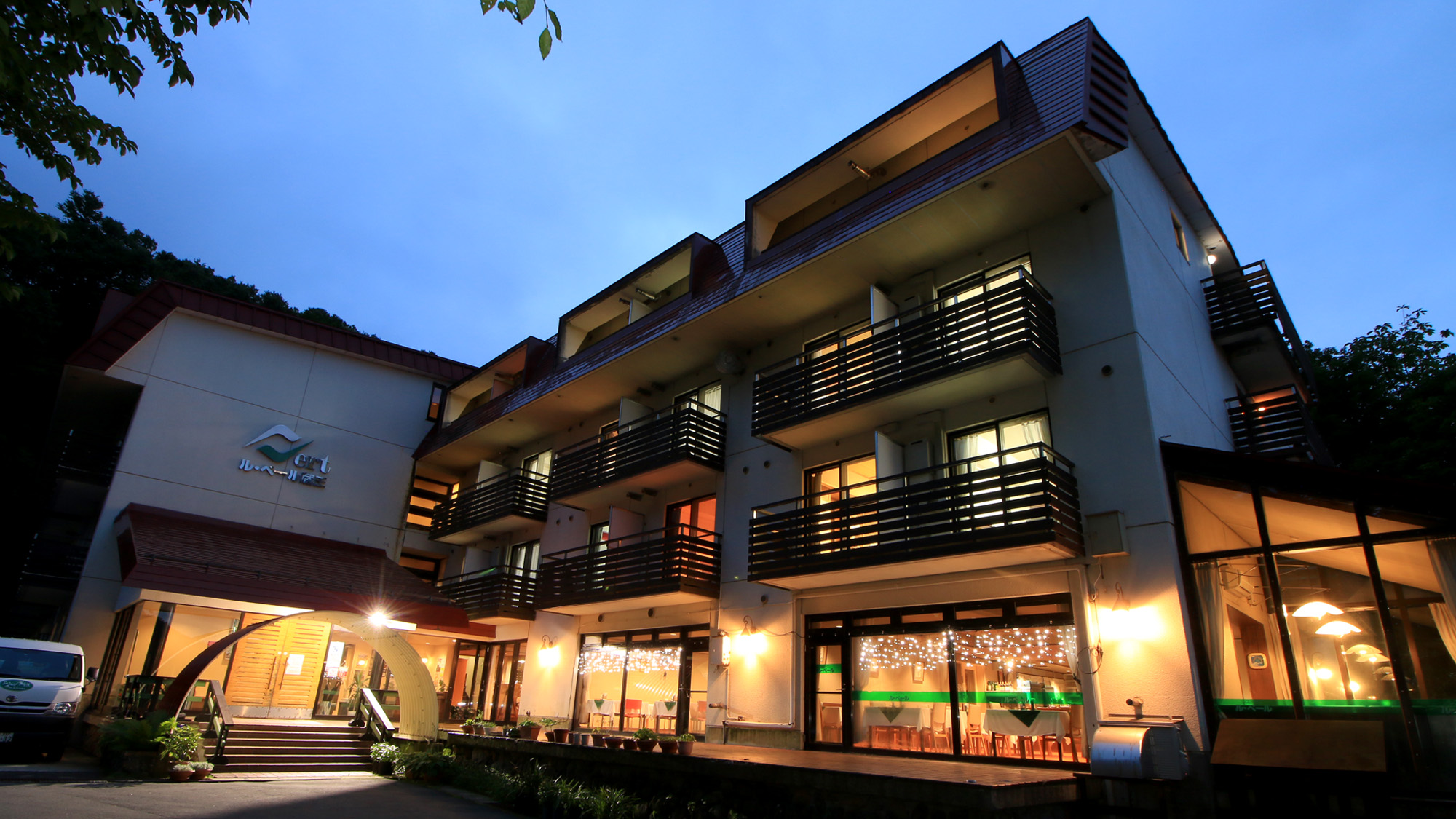 Zao Onsen Levert Zao蔵王温泉 ル・ベール蔵王
Zao Onsen Levert Zao蔵王温泉 ル・ベール蔵王- Address 878-5 Zao Onsen, Yamagata-shi, Yamagata View Map
- Original source: Rakuten Travel
3. Goshogake Onsen (Akita Prefecture): An Elegant Hot Spring Resort with Views of Rising Steam
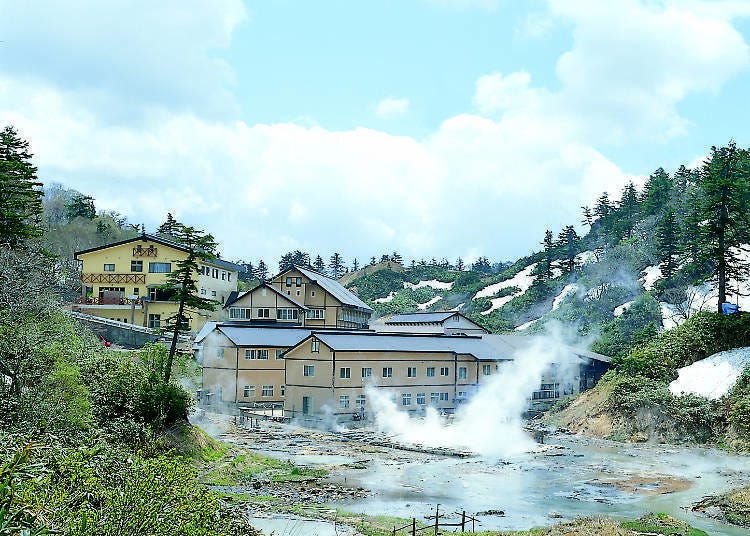
Goshogake Onsen is located a 50-minute drive from Kazuno-Hanawa Station on JR’s Hanawa Line. This house-style inn surrounded by forest is along the Hachimantai Aspite Line, connecting Akita and Iwate prefectures.
The hot spring comes from a sulfur spring that offers a range of sulfide minerals.
The waters here are said to have healing properties for those who suffer from gastrointestinal disorders, neuralgia, low back pain, knee arthritis, after-effects from car crashes, rheumatoid arthritis, asthma, health conditions specific to women, menopause, psychosomatic disorders, circulatory disorders, and hemorrhoids.
It also aids those undergoing rehabilitation therapy for broken bones and other injuries, those recovering from organ surgery, those in need of treatments for cold sensitivity, as well as those in need of treatment for any other conditions dealing with being overly sensitive to the cold.
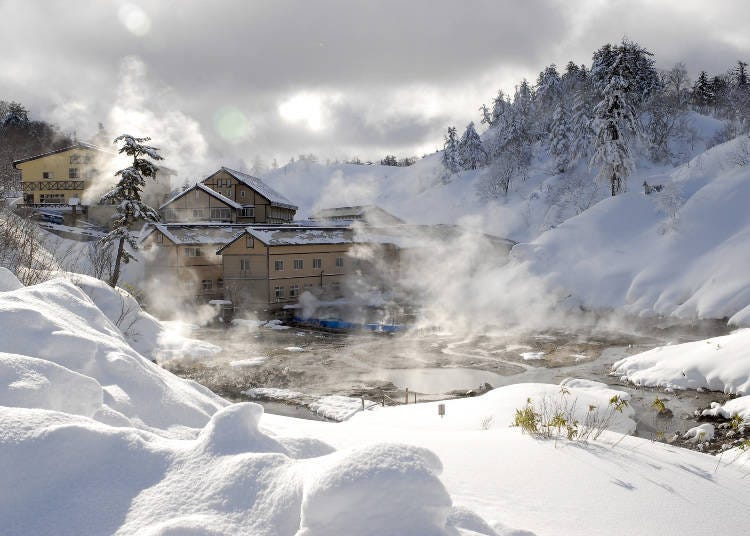
In addition to the traditional Japanese inn, there is a toji facility on the hot spring grounds. Here you can even find ondol, heated flooring powered by geothermal energy from the hot springs.
When laying down on the floor, your body absorbs heat at a continuous rate. This is said to relieve any burden on your heart while also alleviating neuralgia symptoms in your legs and hips.
Those who book long stays will experience an overall rise in body temperature, contributing to strengthening immunity. It’s also said to make you more receptive to natural healing treatments.
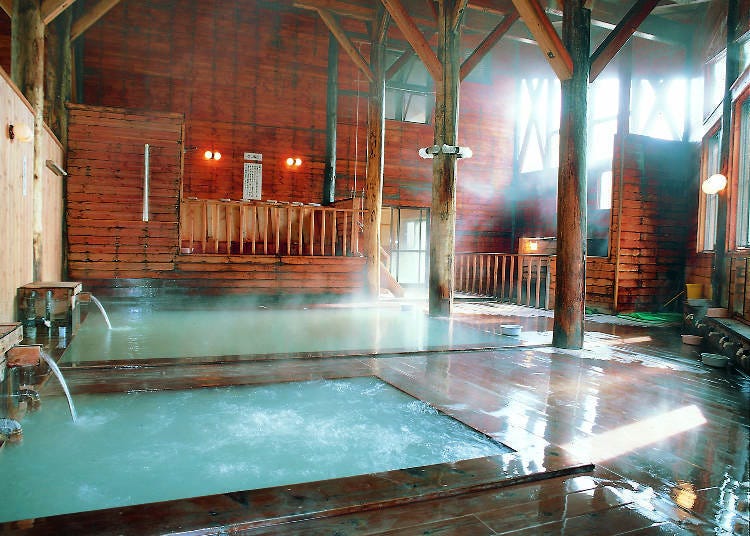
Types of baths include kazan-buro, baths where bubbles rise to the water’s surface; doro-buro, mud baths that act as a heat patch alleviating pain that comes from neuralgia, rheumatoid arthritis, or after-effects from injuries; and hako-mushi baths.
Here, you will have more than enough options to enjoy the hot spring waters fully! And with no other homes or buildings in sight, you can experience a striking night sky lit brightly by the moon.
Located on a mountain with an altitude of 1,000 meters, the air surrounding the night sky is clean and crisp, and the view from the open-air bath will make you feel as though you could reach the stars. Prepare to be embraced by Tohoku’s nature!
Please note that signs or guides in foreign languages are unavailable and that staff service is limited to providing information on meal times etc.
-

-
Address
Kumazawa, Hachimantai, Kazuno-shi, Akita, 018-5141
View Map -
Nearest Station
Tazawako Station (Tazawako Line)
115 minutes by bus
- Phone Number 0186-31-2221
Vacancy search, reservation
-
Please enquire directly about rates.
Check with our partner site as the latest rates, rate details, and guest room requirements may vary.
-
Address
Kumazawa, Hachimantai, Kazuno-shi, Akita, 018-5141
4. Sakayu Onsen (Amori Prefecture): A Hot Spring Birthed from Volcanos on the Hakkoda Mountains
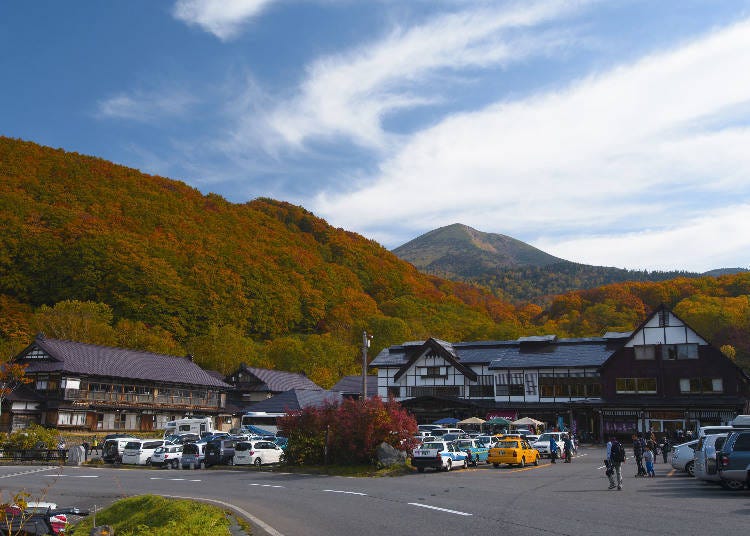
Sakayu Onsen is located a one-hour drive from JR’s Aomori Station. The hot spring source is said to come from a volcanic mountain range called the Hakkoda Mountains.
According to legend, in 1684, hunters found this hot spring while chasing after a wounded deer that led them into the mountains.
What’s left of the old explosion crater where the hot spring now lies is known as Jigokunuma or hell swamp. To this day, sulfur dioxide and hot spring water can be seen gushing from the crater’s fumaroles.
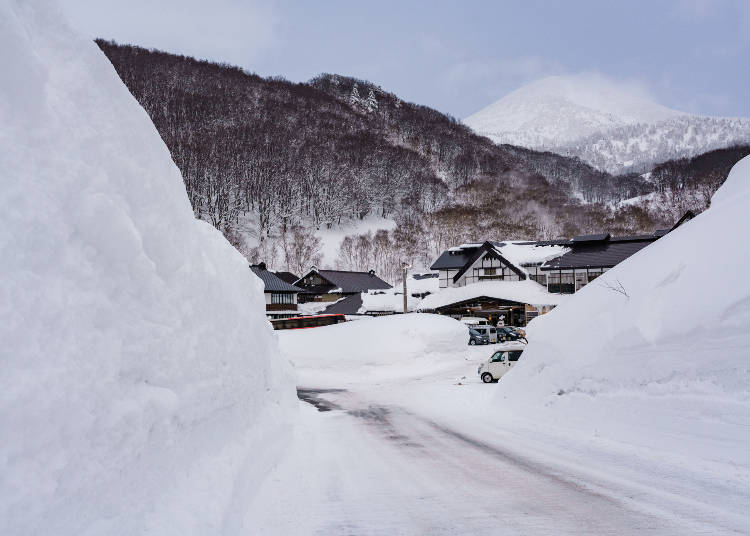
Starting from the Edo period (1603~1868), many people looking to use the hot springs for toji visited Sakayu Onsen.
What’s more, the region’s locals built cabins around the communal baths so that hunters and people who came to the mountain to gather vegetables could use the hot springs regularly.
Some of the various springs available include an acidic spring, an iron-filled spring, an aluminum sulfate spring, a salt spring, and a highly-acidic sulfur spring.
Bathing in these springs is said to soothe those suffering from neuralgia, rheumatoid arthritis, skin diseases, or health conditions specific to women.
For accommodation, you have the choice of either staying at a traditional Japanese inn or a toji facility. However, it’s good to note that the majority of the guest rooms available are for toji accommodation.
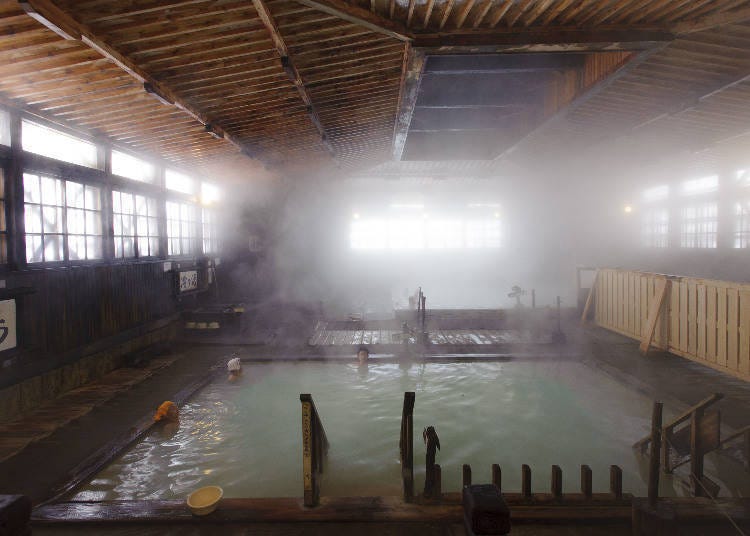
The large communal bath is called Hiba Sennin-buro, which translates to bath for 1,000 people. Two large baths made from cypress are located in the spacious bathing facility that spans approximately 256 square meters.
Although there are separate changing rooms for men and women, this is a mixed-gender hot spring where the bathing areas are split down the middle.
There was a partition placed in the middle of the bath in the past to separate each section further. However, many people claimed that the partition took the charm out of Sukayu Onsen, so it was quickly removed.
There’s a women-only time frame early in the morning for women who have reservations about the unisex bath. Moreover, at the bathing facility Tamonoyu, you can enjoy gender-separated bathing areas.
There are English guides as well as staff who can speak conversational English at this facility. Take this opportunity to learn more about Sukayu Onsen and Amori’s culture!
-
Sukayu Onsen酸ヶ湯温泉
- Address 50 Yuzawa Kobayashi, National Forest, Arakawa Minami-Arakawayama, Aomori City, Aomori 030-0197
TEL: 017-738-6400 (Sukayu Onsen)
5. Oyasukyo Onsen (Akita Prefecture): Enjoy Beautiful Views of a Gorge
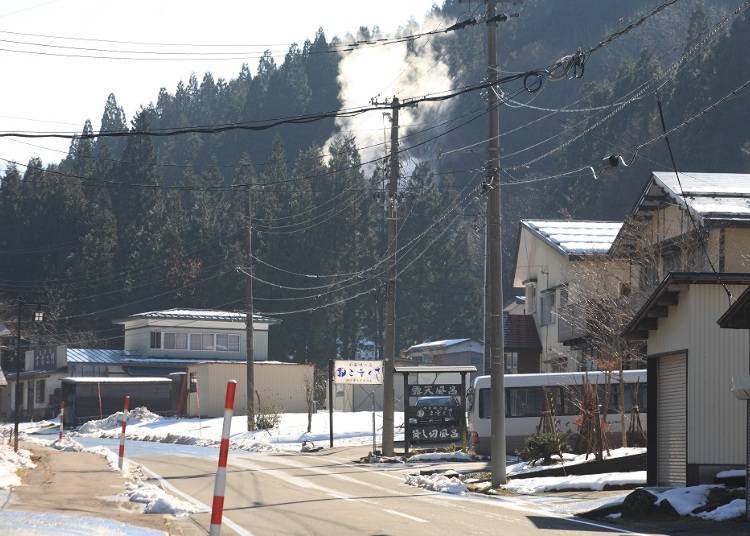
Oyasukyo Onsen is a 50-minute drive from JR’s Yuzawa Station.
The hot spring resort is built around Oyasukyo Gorge, formed through fluvial erosion caused by the Minase River. People began to enjoy the hot spring’s waters around the beginning of the Edo period (1603).
As to how the hot spring was discovered, a well-known origin story is that, around this time, people found a crane that had injured its leg dressing its wounds in the spring’s healing waters.
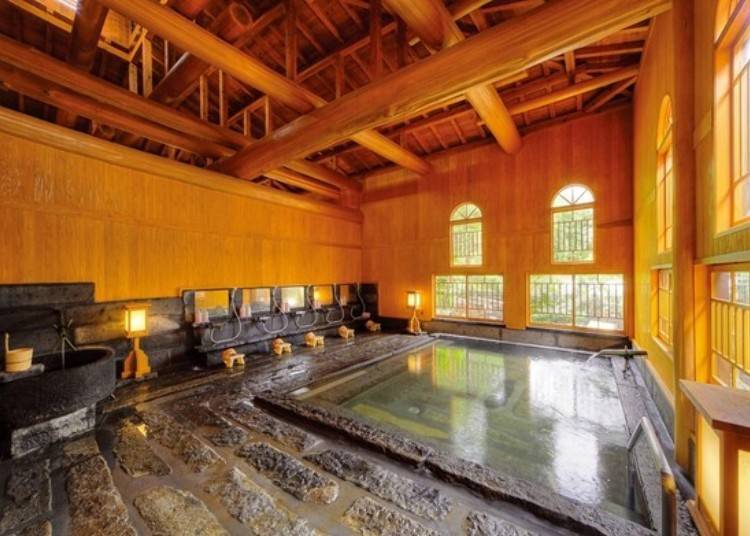
The hot spring water comes from a simple thermal spring, relieving the body of stiffness by alleviating low back pain, muscle aches, and stiff shoulders. Also, because drinking this spring water is said to lower blood sugar, it's widely popular among people who have diabetes.
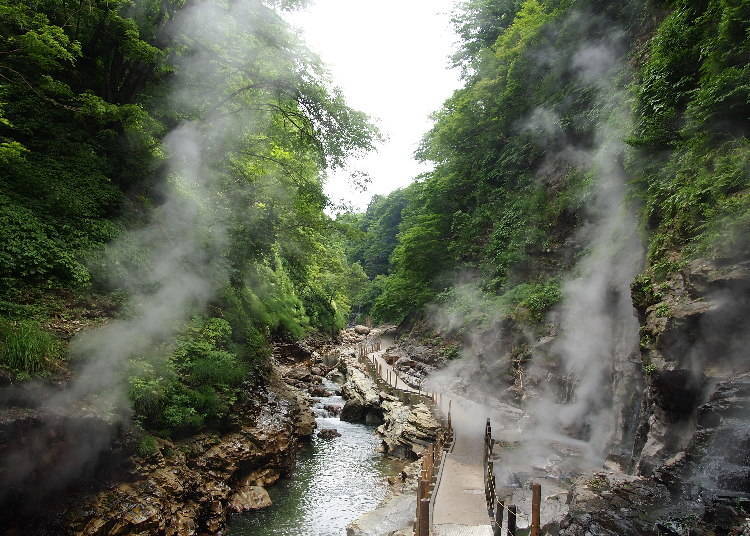
At a scolding 98°C, large quantities of hot spring water gush from Oyasuko’s fountain. Even the famous Edo period traveler and writer, Masumi Sugae, documented his experience here in a journal entry
. One excerpt from this entry includes, “I heard an explosive sound like the roaring of a thunder god as water gushed from the spring.”
Furthermore, you will find a famous traditional Japanese inn at this hot spring village that offers baths for day use, a communal bath, and a free footbath area. We recommend taking a tour of these three facilities that all have something special to offer.
You can find signs and guides in English at all the sightseeing spots. Services differ at each accommodation, so we recommend checking beforehand to see what is offered.
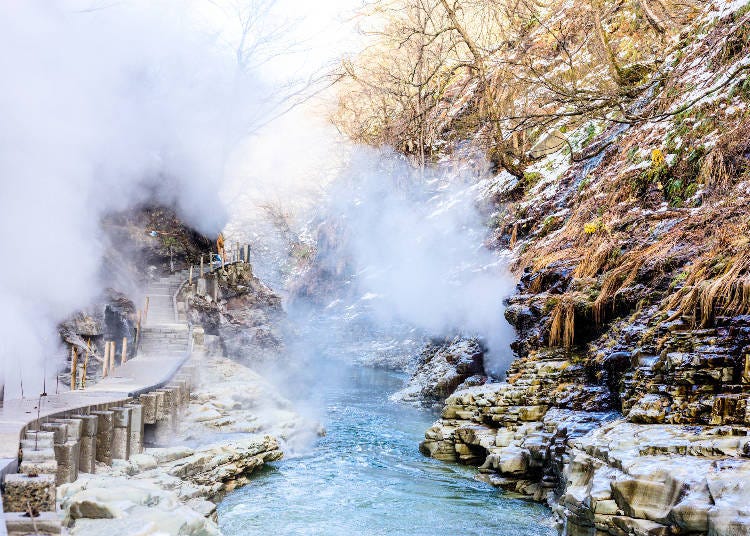
-

-
Address
Aratoko, Minase, Yuzawa-shi, Akita, 012-0183
View Map -
Nearest Station
Yuzawa Station (Ou Line)
50 minutes by bus
- Phone Number 0183-47-5080
-
Address
Aratoko, Minase, Yuzawa-shi, Akita, 012-0183
Enjoy a Hot Spring Tour While Taking Recommended Safety Precautions!
In addition to what was introduced in this article, the Tohoku region has countless numbers of spectacular hot springs to visit.
With most facilities being located deep in the mountains, these secluded hot springs can be hard to get to. Due to accessibility being even more difficult in the past, you can imagine the alluring qualities of these hot springs that have continuously drawn visitors.
Although hot springs have wonderful rejuvenating qualities, they can also be dangerous when used for prolonged periods of time. Please make sure to follow all safety precautions while enjoying a one-of-a-kind bathing experience!
*The information in this article is from December 2021 and updated in December 2023. Due to the information listed being subject to change, please contact each hot spring facility before visiting.
▼Other Hot Spring Resorts to Visit!
Residing in Sapporo, Masakazu has built his career in various private enterprises and government positions in Hokkaido. In April 2016, he transitioned from being a company employee to a freelance writer. Currently, Masakazu works as a freelance writer alongside other occupations, primarily focusing on showcasing the charm of Hokkaido through web media platforms.
- Area
- Category
*Prices and options mentioned are subject to change.
*Unless stated otherwise, all prices include tax.
Popular Tours & Activitiess
Recommended places for you
-
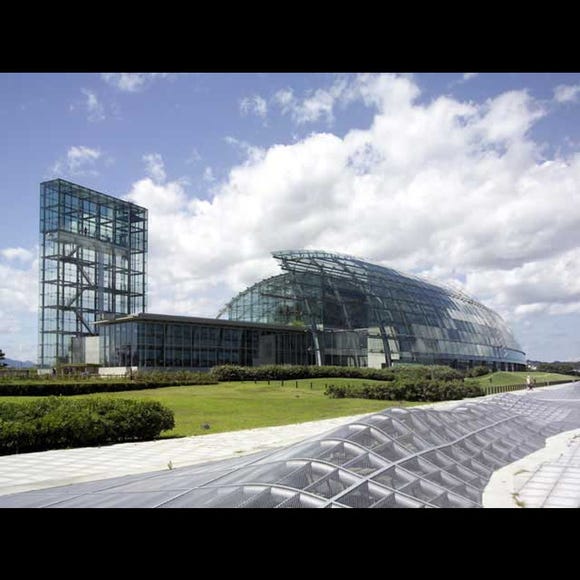
Aquamarine Fukushima
Zoos, Aquariums & Botanical Gardens
Fukushima, Koriyama And Iwaki
-

Oirase River
Rivers, Lakes & Canyons
Other Surrounding Areas Of Aomori
-
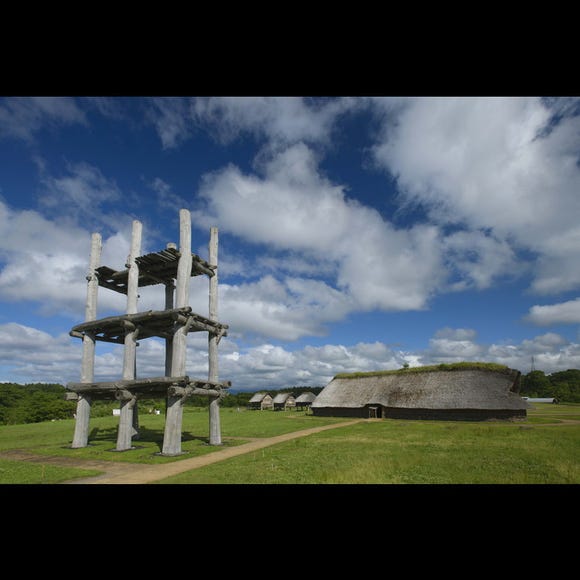
Sannai-Maruyama Site
Village Ruins
Aomori, Hirosaki And Hachinohe
-

Geibikei Gorge
Rivers, Lakes & Canyons
Morioka, Hiraizumi And Hachimantai
-

Ginzan Onsen
Hot Springs (Onsen) & Bath Houses (Sento)
Surrounding Areas Of Yamagata
-

Nikka Whisky Sendai Distillery
Culture Experience
Sendai And Matsushima
-
Ad

Start Your Journey from Yamagata Station: Explore Four Seasons of History, Hot Springs, and Festivals
-

Aomori's Quiet Side in Autumn: 5 Scenic Spots in Hachinohe According to a Local
by: Marco Blasco
-
Ad

Discover Kanazawa: History, Culture, and How to Get Around with Ease
-
Ad

Scandinavian Brands Meet Harajuku: Inside Japan's Only Flagship Stores for Haglöfs and D_b_
-

8 Luxury Tohoku Ryokans: Private Onsen, Gourmet Wagyu, and Winter Views
by: Sae Haneda
-
Ad

Why Fukushima is the Next Big Food Destination in Japan The Foodie Paradise Only 90 Minutes from Tokyo
-

Nyuto Onsen: Famous Baths with Breathtaking Winter Sights in Akita's Renowned Hot Spring Village
-

Japanese Foods List: 16 Crazy Tasty Japanese Tohoku Region Dishes You've Never Heard of
by: Guest Contributor
-

18 Travel Secrets of Aomori Japan: Guide for Sightseeing, Shopping, and More
by: Guest Contributor
-

5 Ryokan in Akiu Onsen You'll Want to Bookmark for a Tohoku Trip
by: Guest Contributor
-

Plan Your Visit to Zao Onsen (Yamagata) - A Comprehensive Guide
-

Best Outlet Malls Near Sendai: Shopping, Souvenirs, and Discounts















